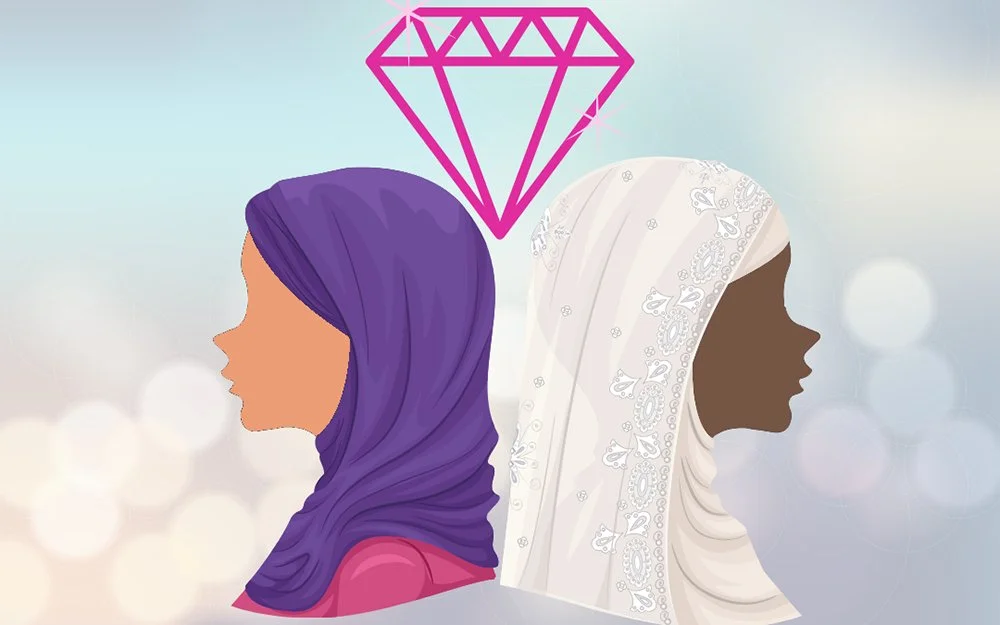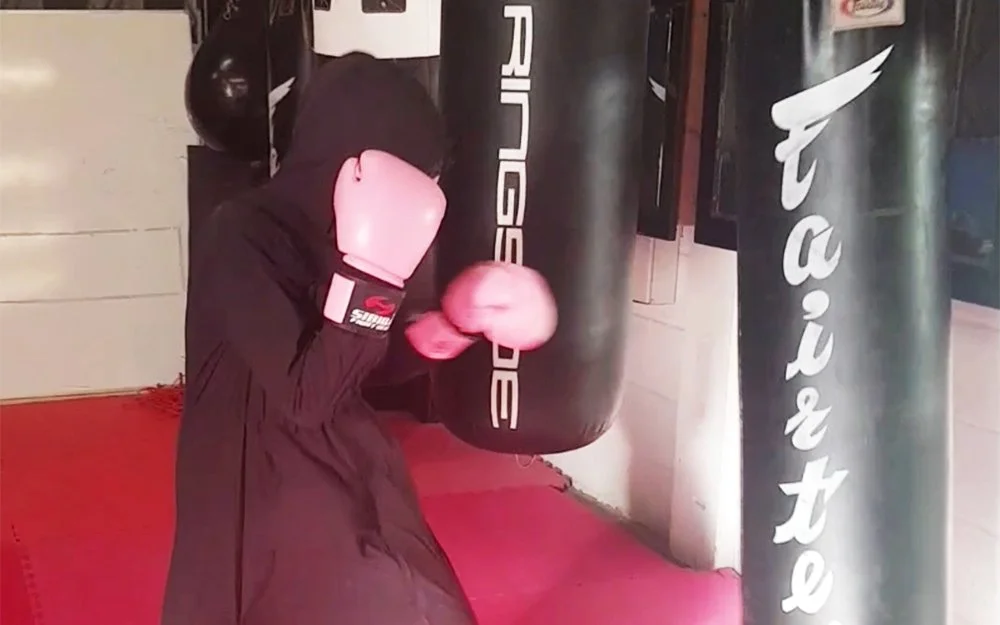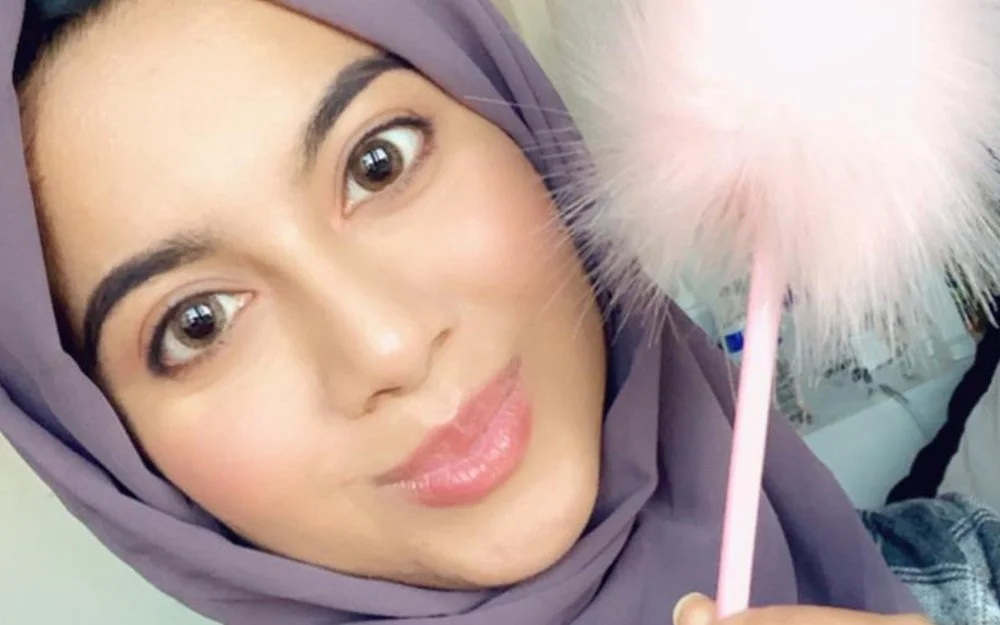Touchstone Tales — Pink Dimond Girls
Jun 09, 2020
Guest blog by Sudha Bhuchar, award-winning actor and playwright. Sudha is the winner of a co-commission from Revoluton Arts and Wellcome Collection exploring the theme of 'touch' in Bury Park through arts and creativity.
Luckily my date with Hasina Rahman, founder of Pink Diamond Martial arts club, and the girls she has invited to my workshop is on Zoom. For as we start to talk and share stories, the revelation that they are capable of grappling with and wrestling unwanted intruders to the ground would have made me extremely nervous if meeting them physically. I could have found myself in a ‘choke’ that I could not get out of! Not that they see me as an intruder, but I am acutely aware of the trust that is invested in me when people reveal often quite intimate episodes of their life and grant me the freedom to shape fiction inspired by and moulded from their verbatim testimony. This trust is both a privilege and a responsibility. Capturing how people self-define so they can see themselves in the final story? That is my tussle. If only I did martial arts — I’m sure that would help.
As ever we start with intros — ‘hard’ and ‘soft’ facts about ourselves.
I share that the current lockdown reminded me of when at the age of 14, I didn’t leave the house for the whole summer holidays, too scared to go out. I had not known about the term, agoraphobia. It may have helped, knowing I wasn’t alone.
One by one the girls echo my exact story.
‘I done the same thing as you. Whole summer didn’t leave the house. I don’t know what that was about.’
‘I also spent time in my house like you both.’
‘I was very shy when younger. At 14/15 I came out of my shell and started Hasina’s classes.’
I also wonder what it was about! Us as Asian women. Generations apart yet experiencing the same trepidation and fear of the world as teenagers? Like now, feeling safer inside.
Another attendee enters but she can’t see us, and we can’t see her.
‘Is she listening? She can use the chat function.’
‘We can’t see you. Can you hear us?’ I shout, rather like when my sons accuse me of my volume rising, when speaking to cousins in India.
She types, ‘Yes’.
Imrana Mahmood, Revoluton’s trusted coordinator of my ‘Touchstone Tales’ commission, comes to the rescue through the chat function.
‘We are listening to you through your words. Type your contributions.’
The first typed words reveal she is 38-weeks pregnant. First child. Lockdown baby. Her ‘hard’ and ‘soft’ fact’.
We are here to explore the theme of touch. What does the word evoke?
‘Empathy. When someone is going through a hard time and can’t talk. Touch can allow them to express their words.’
‘From birth to death, touch is necessary to survive.’
‘We can eat food, drink water and live. We won’t die without touch but a part of us will die. Humans need touch, especially in lockdown.’
They are doing their classes on Skype now but unanimously express that it’s not the same. Touch is the very thing that’s missing; the physical contact they have learned to cherish in the ‘female only’ oasis that Pink Diamond is. They yearn for its return.
Hasina’s story of how and why she founded Pink Diamond is compelling.
Growing up in Bournemouth as a teenager, the beautiful beaches did not compensate for the bullying she suffered in her 90% white school. Verbal, which can scar for a long time.
‘The girls would pass notes to each other, saying I was the N-word. They didn’t see me as a brown person. They saw me as black. They only thought there was white and black.’
She acknowledges it was borne out of ignorance and lack of education about minority communities. She told no one. The teachers saw it but did nothing. She lost her voice and her confidence.
‘In a way I forgot to speak because I was trying not to be noticed. When I looked in the mirror, I wanted to be white. I needed something because literally I was depressed.’
Again, a mirror of my teenage years and those of others in the group. Feeling different, being bullied or silenced for your size, race, culture.
Another fun fact — I wore my coat for two years as a teenager, wanting to disappear. It had the opposite effect of making me hyper-visible for the wrong reasons! Many years later, I found my voice through joining Tara Arts and theatre and acting entering my life serendipitously.
For Hasina and the girls, it was discovering martial arts. Starting with a karate class.
‘As soon as I stepped in there, it was like a passion was released from me’.
She went on to get her black belt in karate, secretly, telling her parents she was at ‘fitness’ class.
Others also expressed how Asian parents didn’t necessarily see the value of martial arts for girls, maybe expecting them to be ‘protected’ by future husbands.
Imrana shares her experience, ‘When I did taekwondo, it was a mixed class. Mum freaked out. Maybe you shouldn’t do it anymore!’
The same parents have been taken on a journey and seeing their daughters grow in strength and confidence has fuelled parental pride in their significant achievements.
Hasina is unequivocal on the subject. The main aim is self-defence.
‘I want the girls to be prepared for any situation. It happened to me when I was younger. I was prepared.’
Stories are shared of the reality and possibility of unwanted touch and how martial arts has instilled confidence and ability to stand your ground.
The physical practice of learning how to get out of a ‘choke’, surprise your attacker and not being caught up with the panic and emotions of that moment.
The ‘female only’ environment is essential.
All the girls practice their faith and visibly identify as Muslim, choosing to cover up to varying degrees. Everyone’s reasons for coming are personal — wanting to feel empowered, lose weight, escape the ‘busy mum’ life or as we read on the chat.
‘Jackie Chan was the reason, I love him.’
Hasina adds modestly,
‘The reason my classes are popular is that I am a relatable person. In my hijab/jilbab, I just look like an everyday Muslim sister lol.’
The classes offer a safe space to de-robe and practise together.
‘It’s everyone in their leggings, T-shirts. A lot of the non-Muslim sisters get really surprised when the niqabi sisters — they are literally head to toe covered — and when they take that off, they’re like ‘WOW’. It’s amazing to see how strong they can be.’
The talk of unwanted touch leads to an animated discussion about ‘covering up’ and reasons for wearing hijab/jilbab. Is it meant as a signal to respect the personal space of the wearer?
‘It builds a solidarity between other women that wear it. Obviously, it does create a boundary between you and men which is fine I think.’
‘I wear hijab cos it’s part of my faith. I don’t think about what the message for other people is. There is an intersectionality of reasons why women wear it.’
‘It invites the idea of consent if you think about it. Non-Muslim men or maybe even Muslim men — if a woman isn’t wearing it, they’re probably more likely to touch them without asking their permission. Whereas if they’re wearing it, it also asks the question, ‘Maybe I shouldn’t do that.’ It makes them second guess whether what they’re doing is right’.
‘When I’m out and about so I’m visibly Muslim cos I’ve got the headscarf on and I see other Muslim sisters, even if they’re strangers, they’ll come and give us a hug and greet me. If I go to mosque, I’ll be hugging them, handshaking them and doing cheek to cheek.’
Hasina and the girls have a strong sense of sisterhood and agree that the ultimate reason for covering up is to be close to God.
‘It’s something that makes you feel special as a woman and you have that connection with your creator.’
Hasina’s clarity is a guiding light for her students who see her lived experience reflected in their lives.
‘It was martial arts that got me out of the depression, got me out of the hatred that I had, that I got from bullying. The more confident I got, I started to love the colour of my skin and everything fell into place. Rediscovering my religion was a big part of the change. This is what carried through the self-love and confidence.’
At the club, the students can take mixed martial arts, Muay Thai and kickboxing and even Pilates.
Fat burning and body sculpting are welcome outcomes, but everyone was clear about enjoying the ‘contact’ nature of the experience. The closeness.
‘It brings people together in different ways.’
‘You’re constantly in personal space with each other — doing sparring, literally wrestling with each other. Doing ‘chokes’, obviously supervised.’
‘Martial arts is a language itself. The way you use your body, the way you work together. You have to be in tune with another person, it’s art’.
‘It’s affection as well, that’s how I show affection. Just like a pat on the shoulders’.
The girls are entering tournaments putting their skills into practice.
‘It's like revising for an exam, but to actually know it, you actually try it. I’ve taken my fair share of punches. It’s important to have that contact.’
We share anecdotes through talking about objects we have around us that evoke memories of significant touch.
‘I chose my hand wraps. You have to wrap them round your fingers. I love them so much because they look like something a Ninja would wear … I can put this on and it’s purely my power that’s hitting the pad. I hit the pad as hard as I can, and you hear that satisfying sound. I come into heavy contact with it and my hand goes flying. It’s so exhilarating. It’s in sync.’
Furious typing in the chat room is read out loud.
‘My boxing shorts. Reminds me of first being able to test my skill in the ring. As my parents have pushed me to achieve outside my comfort zone. I’m not hitting pads anymore or the bags, but I’m using it in a situation where adrenaline kicks in and with my hands and feet fluidly moving. It’s purely your power.’
Hasina shares her oversized pink boxing glove. Gifted to her by a popular Polish man who ran the men’s class as a ‘welcome to Luton town’ and a warm welcome to join the martial arts community.
Hasina came to Luton after marriage to a man she chose herself through inviting CVs of prospective candidates. Doing it ‘the traditional way but I’m in charge’.
Not for her any of the guys who find a woman doing flying kicks and punching intimidating. Her husband is extremely supportive.
When they were getting married, she asked him for a pink diamond.
‘You do know they’re about 10 million pounds?’
She settled for naming her club that. Very original. Very girly. She is adamant that being girly is part of the package. This too resonates.
‘My object is a pink, fairly fluffy pen. I’ve always written poems, thoughts, feelings. How to help others. I used to be a tutor when I was shy. Now I talk about mental health. As soon as I have an idea, I go for the fluffiest pen and write it down. Key words. Capturing ideas and inviting younger generation on Instagram to respond.’
‘Team Hasina’ Muay Thai shorts are now the new uniform as the club has grown.
‘I thought they made my butt look big, but I don’t care anymore. I’m gonna wear them.’
Looking at the size of them, I know my butt is definitely too big. Maybe Hasina can be invited to Wimbledon to start a club for women like me ‘of a certain age’! I have certainly missed out …
Check out:
Pink Diamond Martial Arts on Facebook and
Instagram @pinkdiamondmartialarts
Creative events inspired by Bury Park
Hasina and The Pink Diamond girls have contributed submissions to the crowdsourced film chronicling ‘Ramadan in Lockdown Luton’, edited and curated by Lydia Howe.
The film will have its world premiere on Zoom and Facebook Live on Thursday 18 June at 7.30pm.
My new monologue ‘The Eid Hug’, performed by Naveed Khan will also form part of the event.
The girls have also inspired my monologue, ‘The Ninja sister’ which will be performed on Friday 26 June at 7.30pm by Luton born and bred actress Hussina Raja as part of the Touchstone Tales showcase event, culminating the Digital Revoluton season.
Thankfully, I have their blessings for my work, so hopefully can exhale …




